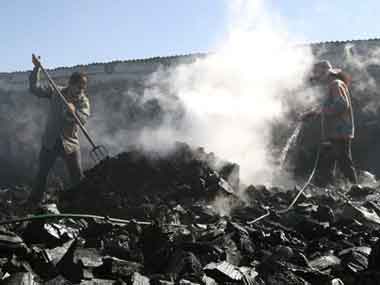By R Jagannathan
Nirmal Chandra Jha has been boss of the world’s largest coal company, Coal India Ltd, since 1 March 2011. But that’s not the reason why he will be remembered.
Jha will be remembered because he was never made its chairman officially - and he retires on Tuesday, 31 January, as acting chairman.
He will be remembered because less than a month after he announced a shift in Coal India’s pricing policy from useful heat value (UHV) to gross calorific value (GCV) he is having to revise prices downwards to allow loss-making power companies from becoming bigger losers.
He will be remembered for taking Coal India to the most valued company status briefly last year - only to see it tumble to No 4 this year, thanks to policy flip-flops.
Jha will thus leave Coal India as a man who was let down twice by his political bosses: once, by denying him even the dignity of being the official chairman before he retired (he held his job as acting chairman in addition to his job as technical director), and the second time by forcing him to roll back a part of his pricing reform.
[caption id=“attachment_198324” align=“alignleft” width=“380” caption=“Acting chairman of the world’s largest coal company willbe remembered because he was never made its chairman officially. Jha retires on Tuesday, 31 January, as acting chairman.”]  [/caption]
In a press statement, Jha said: “We were planning to revisit the pricing in March. But the coal ministry had formally sent a letter on 25 January asking us to relook the prices now to prevent any major impact from the previous prices regime. But, GCV (gross calorific value) mechanism will not be rolled back.”
In short, the reform stays in form, but not substance. By forcing Jha to roll back the prices in some sectors, the government has essentially signalled that it is not serious about energy reforms.
As Jha told DNA in an interview on Monday, Coal India already sells the most discounted coal in the world. Coal - graded by quality from A to F, with F being the lowest - was being sold at huge discounts to the international price ranging from 25-77 percent. While A was sold at a discount of 24-25 percent to Indonesian coal, the F quality, used mostly by power plants, was being discounted the most.
The shift to the GCV method would have pushed up some prices - but not all. As Jha notes, “Our approach for GCV was discount to international parity price. Now the approach will be the current price being paid by customers.” It will be revenue-neutral.
In other words, prices will soon be more or less back to where they were a month ago.
The government, it seems, is scared of even minor reforms.


)
)
)
)
)
)
)
)
)



